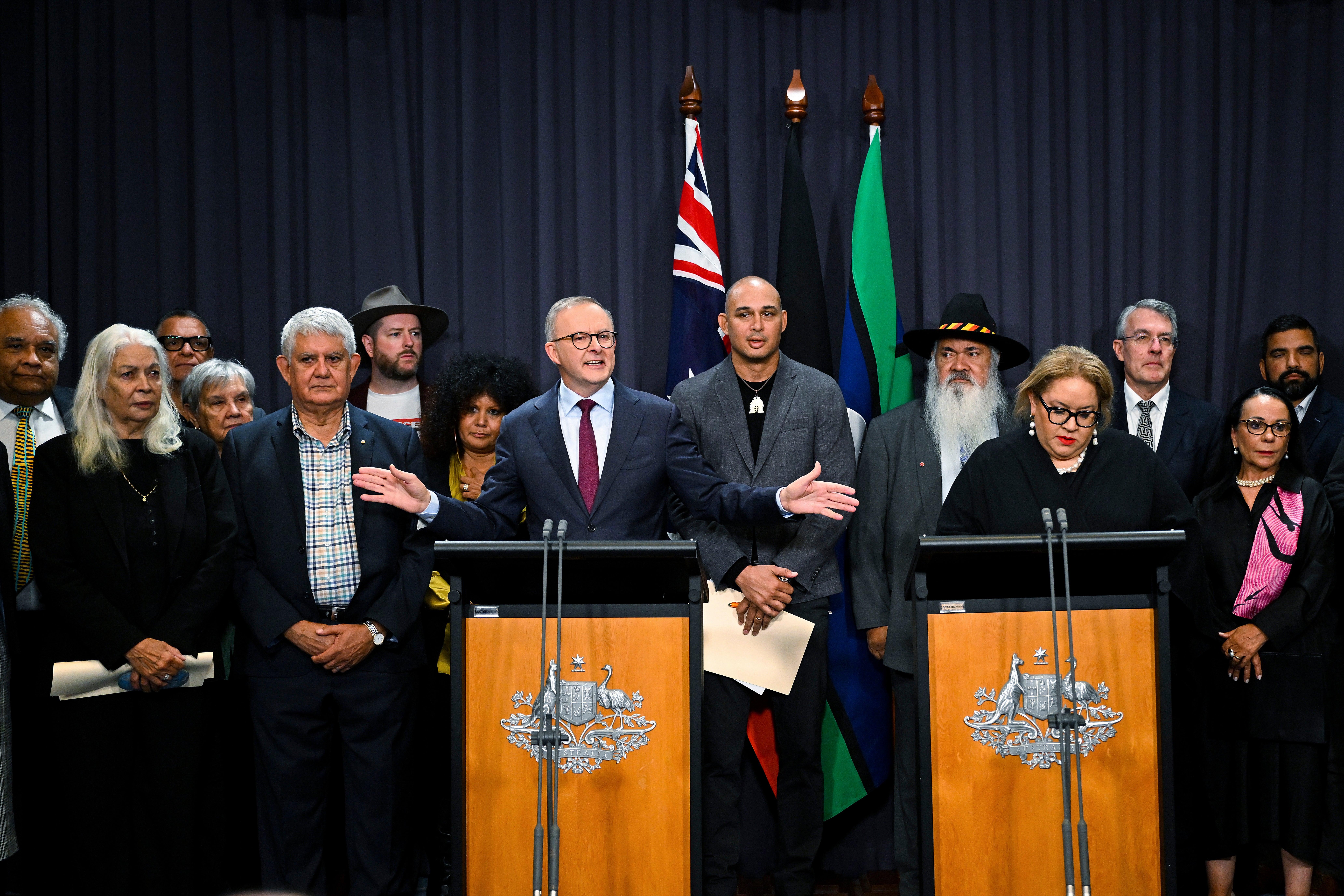Australia decides referendum question to create Black Voice
The Australian government has released the wording of a referendum question that promises Indigenous people a greater say on policies that affect their lives

Your support helps us to tell the story
From reproductive rights to climate change to Big Tech, The Independent is on the ground when the story is developing. Whether it's investigating the financials of Elon Musk's pro-Trump PAC or producing our latest documentary, 'The A Word', which shines a light on the American women fighting for reproductive rights, we know how important it is to parse out the facts from the messaging.
At such a critical moment in US history, we need reporters on the ground. Your donation allows us to keep sending journalists to speak to both sides of the story.
The Independent is trusted by Americans across the entire political spectrum. And unlike many other quality news outlets, we choose not to lock Americans out of our reporting and analysis with paywalls. We believe quality journalism should be available to everyone, paid for by those who can afford it.
Your support makes all the difference.The Australian government on Thursday released the wording of a referendum question that promises the nation’s Indigenous population a greater say on policies that effect their lives.
Australians will vote sometime between October and December on the referendum that would enshrine in the constitution an Indigenous Voice to Parliament.
An emotional Prime Minister Anthony Albanese said such a body promoting Indigenous views to the government and Parliament was needed to overcome Indigenous disadvantage.
“We urgently need better outcomes because it’s not good enough where we’re at in 2023,” Albanese told reporters.
Indigenous Australians from the Torres Strait archipelago off the northeast coast are culturally distinct from the mainland Aboriginal population. The two peoples account for 3.2% of the Australian population and are the nation’s most disadvantaged ethnic group.
“On every measure, there is a gap between the lives of Aboriginal and Torres Strait Islander peoples and the national average,” Albanese said.
“A 10-year gap in life expectancy, a suicide rate twice as high, tragic levels of child mortality and disease, a massive overrepresentation in the prison population and deaths in custody, in children sent to out-of-home care,” he said.
“And this is not because of a shortage of goodwill or good intentions on any side of politics and it’s not because of a lack of funds. It’s because governments have spent decades trying to impose solutions from Canberra rather than consulting with communities,” he added.
The wording of the referendum question that the Cabinet signed off on Thursday is similar to words proposed by Albanese last year.
The question will be: “A proposed law: To alter the constitution to recognise the First Peoples of Australia by establishing an Aboriginal and Torres Strait Islander Voice. Do you approve this proposed alteration?”
If the referendum succeeds, the constitution would state that the “Voice may make representations” to the Parliament and government “on matters relating to Aboriginal and Torres Strait Islander peoples.”
The Parliament would make laws relating to the Voice “including its composition, functions, powers and procedures.”
Opinion polls suggest most Australians support the Voice concept, which Albanese announced was a majority priority of his center-left Labor Party government during his election night victory speech in May last year. But deep divisions remain across Australian society.
Opposition leader Peter Dutton said his conservative Liberal Party has yet to decide whether they would support the Voice and required more detail including the government’s own legal advice.
The Nationals party, the junior coalition partner in the former government, announced in November they had decided to oppose the Voice, saying it would divide the nation along racial lines.
Australia is unusual among former British colonies in that no treaty was ever signed with the nation’s Indigenous population. The constitution came into effect in 1901 and has never acknowledged the Indigenous population as the country’s original inhabitants.
The term Great Australian Silence was coined late last century to describe an erasure of Indigenous perspectives and experiences from mainstream Australian history.
Changing Australia’s constitution has never been easy and more than four-in five referendums fail.
Of the 44 referendums held since 1901, only eight have been carried and none since 1977.